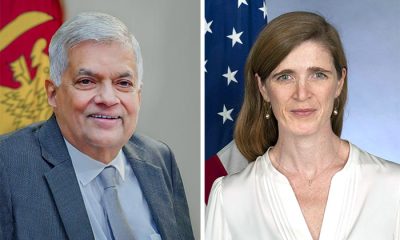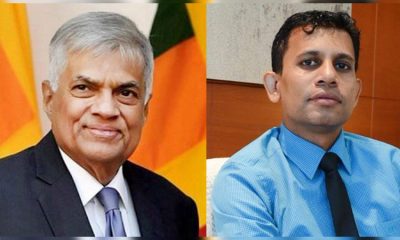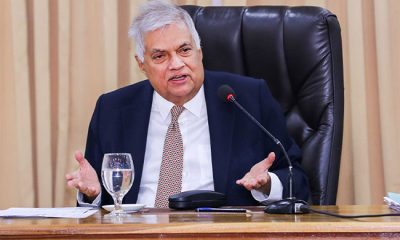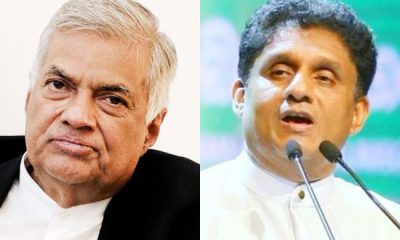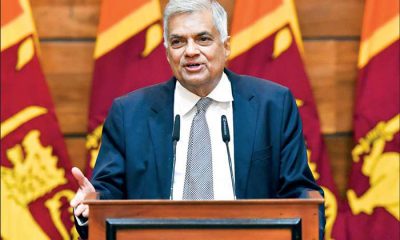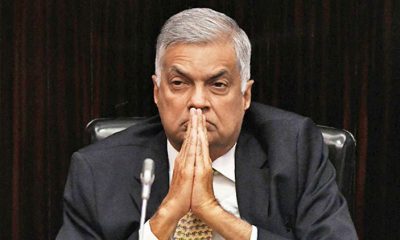News
Prez insists on IMF approved new tax regime, warns of dire consequences unless fully implemented

President Ranil Wickremesinghe, in a televised statement yesterday (18), warned that Sri Lanka wouldn’t be able to obtain assistance of the IMF, or any other lending agencies, or countries, if tough new tax regime was not implemented.
The President said: “If we withdraw from this programme, we will not receive assistance from the IMF. If we don’t get the IMF certification, we will not get the support of those international institutions, such as the World Bank, and Asian Development Bank, and the countries that provide support. If that happens, we will have to go back to the era of queues.
“We may have to face even tougher times ahead. We have to obtain these loans and go for the debt-restructuring programme. We are not doing these wilfully. We have to take certain decisions, even reluctantly.
“However, we will reconsider these decisions periodically.”
The following is the full text of the President’s statement: “An important step in Sri Lanka’s debt restructuring program took place last week. A team under our Minister of State for Finance participated in the annual (October 07) meeting of the International Monetary Fund. Accordingly, a meeting was held under the leadership of the International Monetary Fund, with the countries that had given loans to Sri Lanka and some private institutions that had also given loans.
Over 75 persons participated directly or through zoom technology. The primary purpose of this was to come to a common platform with the 03 main countries that have granted loans to Sri Lanka, namely Japan, China and India, and discuss the next steps to be taken to provide these concessions.
During this meeting, the International Monetary Fund and Sri Lanka pointed out the need for a common platform. India and China have informed us that they will investigate further and provide answers. These two countries have also informed us that bilateral discussions may be required.
Many other countries also participated in this meeting. It is notable that, an Assistant Secretary of the United States Treasury came here. All this was possible because we are implementing the decisions taken in consultation with the International Monetary Fund.
There is one thing about the income of the Government of Sri Lanka. In 2015, when the representatives of the International Monetary Fund came to Sri Lanka, we were told of the need for a surplus in the primary budget. Therefore, we provided that surplus in 2017-2018. But it was reduced as a result of the 2019 Easter Sunday bombings. However, there were no serious issues. They were optimistic that we would be able to increase our revenue, to have a surplus in the primary budget.
At the time, our income was between 14.5% and 15% of the Gross Domestic Product (GDP). However, we agreed that we can gradually increase this to 17%-18%.
However, in November 2019, the country’s taxes were drastically reduced. Then the government revenue decreased to 8.5%. There, the International Monetary Fund declared that it is unable to provide aid because of these agreements.
That year we lost around Rs. 600-700 billion. Simultaneously, we had to face the Covid pandemic. These issues are the main factors that led to the collapse of Sri Lanka’s economy.
The International Monetary Fund notified us that we need to show a surplus in our primary budget. We agreed to it because we needed their support.
The other factor is that it was decided to increase the country’s income from 8.5% to 14.5% of the GDP. It’s impossible to do it all at once. We have planned to increase the country’s income to 14.5% of the GDP by 2026.
Initially, we had to think about how we were going to increase our income. We have printed money because our income decreased. During the past two years, Rs. 2300 billion has been printed. As a result, inflation has risen to 70% – 75%. Food inflation has increased even more.
These need to be controlled, but we also need to secure our income. Therefore, a new tax system was proposed during these discussions. The International Monetary Fund had notified that even the export industries are required to pay taxes.
It was indicated especially in countries with an export economy, taxes are being paid. The IMF also pointed out that our primary export economy was the plantation industry. During British rule, taxes were charged from every plantation sector, including tea, coconut and rubber. Therefore, we decided that if we are to move towards that goal, we will have to pay taxes. The export sector has now questioned this move and if these facts are to be submitted to the International Monetary Fund, we have discussed carrying out an analysis.
The second matter is individual taxes. We have obtained the majority of taxes through indirect taxing. Even the majority of the country’s people below the poverty line had no choice but to pay taxes indirectly. Our direct tax revenue is 20%. 80% which was derived from indirect taxes. The International Monetary Fund had specific questions about it and they were of the view that the amount of tax obtained from direct taxes should exceed 20%. Otherwise, they noted that this would not be successful, as ordinary citizens would be forced to pay taxes.
Therefore, according to this mechanism, and to achieve the goals of 2026, the treasury and the International Monetary Fund discussed the possibility of limiting the taxation from those who have an income of 02 lakhs, but that was not possible. Eventually, income tax was levied on people earning over 100,000. Today, this has become a huge problem in the country.
I would like to point out that based on this backdrop, we may not be able to achieve the desired goals without this tax system. The desired goal is to achieve 14.5% – 15% gross domestic product (GDP) revenue by 2026.
If we withdraw from this program, we will not receive assistance from the IMF. If we don’t get the IMF certification, we will not get the support of those international institutions such as the World Bank, and Asian Development Bank, and the countries that provide support. If that happens, we will have to go back to the era of queues.
We may have to face even tougher times ahead. We have to obtain these loans and go for the debt-restructuring program. We are not doing these wilfully. We have to take certain decisions even reluctantly. However, we will reconsider these decisions periodically.
While successfully conducting our debt restructuring program, we expect to move forward through the economic success achieved through a bountiful Maha season. This will help reduce our economic pressure. We have also discussed measures to increase our foreign reserves. Once we have implemented these measures, we can move forward.
We are in a difficult period. We will have to make tough decisions during these difficult times. I took on this difficult task when no one else was willing to come forward. Hence, I feel I must enlighten everyone regarding this background. The government is ready to discuss this further.
News
US sports envoys to Lanka to champion youth development

The U.S. Embassy in Colombo welcomed the U.S. Sports Envoys to Sri Lanka, former National Basketball Association (NBA) and Women’s National Basketball Association (WNBA) players Stephen Howard and Astou Ndiaye, from June 8 through 14.
The Public Diplomacy section of the U.S. Embassy said that it would launch a weeklong basketball program intended to harness the unifying power of sports, made possible through collaboration with Foundation of Goodness and IImpact Hoop Lab.
While in Sri Lanka, Howard and Ndiaye, both retired professional basketball players, will conduct a weeklong program, Hoops for Hope: Bridging Borders through Basketball. The Sports Envoys will lead basketball clinics and exhibition matches and engage in leadership sessions in Colombo and Southern Province for youth aged 14-18 from Northern, Uva, Eastern and Western Provinces, offering skills and leadership training both on and off the court. The U.S. Envoys will also share their expertise with the Sri Lanka Basketball Federation, national coaches, and players, furthering the development of basketball in the country. Beyond the clinics, they will collaborate with Sri Lankan schoolchildren to take part in a community service project in the Colombo area.
“We are so proud to welcome Stephen and Astou as our Sports Envoys to Sri Lanka, to build on the strong people-to-people connections between the United States and Sri Lanka,” said U.S. Ambassador Julie Chung. “The lessons that will be shared by our Sports Envoys – communication, teamwork, resilience, inclusion, and conflict resolution – are essential for leadership development, community building, equality, and peace. The U.S. Sports Envoy program is a testament to our belief that sports can be a powerful tool in promoting peace and unity.”
News
Rahuman questions sudden cancellation of leave of CEB employees

SJB Colombo District MP Mujibur Rahuman in parliament demanded to know from the government the reasons for CEB suspending the leave of all its employees until further notice from Thursday.
MP Rahuman said that the CEB has got an acting General Manager anew and the latter yesterday morning issued a circular suspending leave of all CEB employees with immediate effect until further notice.
“We demand that Minister Kanchana Wijesekera should explain this to the House. This circular was issued while this debate on the new Electricity Amendment Bill was pending. There are many who oppose this Bill. The Minister must tell parliament the reason for the urge to cancel the leave of CEB employees,” the MP said.However, Speaker Mahinda Yapa Abeywardena prevented Minister Wijesekera responding to the query and said that the matter raised by MP Rahuman was not relevant.
News
CIPM successfully concludes 8th Annual Symposium

The Chartered Institute of Personnel Management (CIPM) successfully concluded the 8th Annual CIPM Symposium, which took place on 31st May 2024. Themed “Nurturing the Human Element—Redefining HRM in a Rapidly Changing World,” the symposium underscored the pivotal role of human resource management (HRM) in today’s dynamic global landscape. Since its inception in 1959, CIPM has been dedicated to advancing the HR profession through education, professional development, and advocacy, solidifying its position as Sri Lanka’s leading professional body for HRM.
Ken Vijayakumar, the President of the CIPM, graced the occasion as the chief guest. The symposium commenced with the welcome address by the Chairperson, Prof. Arosha Adikaram, followed by the Web Launch of the Symposium Proceedings and Abstract Book by the CIPM President. The event featured distinguished addresses, including a speech by Chief Guest Ken Vijayakumar, President of CIPM, and an address by Guest of Honor Shakthi Ranatunga, Chief Operating Officer of MAS Holdings Pvt. Ltd., Sri Lanka.
The symposium also featured an inspiring keynote address by Prof. Mario Fernando, Professor of Management and Director of the Centre for Cross Cultural Management (CCCM) at the University of Wollongong, Australia.
Vote of Thanks of the inauguration session was delivered by Dr. Dillanjani Weeratunga, Symposium Co-chair.
The symposium served as a comprehensive platform for researchers to present their findings across a wide range of critical topics in HRM. These included Cultural Diversity and Inclusion, Talent Development and Retention, Ethical Leadership and Corporate Social Responsibility, Adapting to Technological Advancements, Mental Health and Well-being at Work, Global Workforce Challenges, Employee Empowerment, and Reskilling and Upskilling.
The plenary session was led by Prof. Wasantha Rajapakse. Certificates were awarded to the best paper presenters during the valedictory session, followed by a vote of thanks delivered by Kamani Perera, Manager of Research and Development.
The annual symposium of CIPM was a truly inclusive event, attracting a diverse audience that spanned undergraduates, graduates, working professionals, research scholars and lecturers. This widespread interest highlights the symposium’s significance in the field of HRM, offering a unique opportunity for everyone to network and learn from scholarly brains.The CIPM International Research Symposium was sponsored by Hambantota International Port, Sri Lanka Institute of Information Technology (SLIIT), E B Creasy & Co. PLC, and Print Xcel Company.


